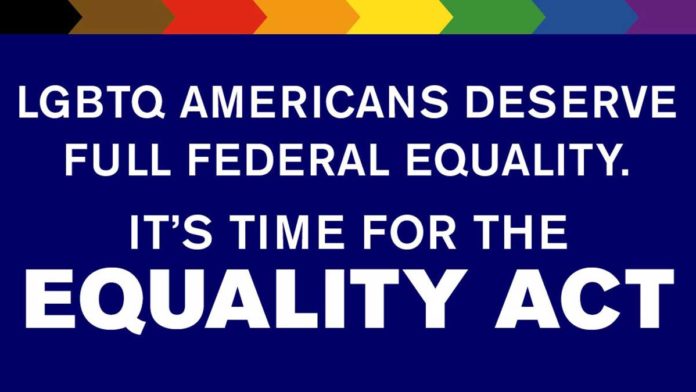On June 15, the U.S. Supreme Court ruled in Bostock v. Clayton that gay, lesbian and trans people are covered by Title VII of the 1964 Civil Rights Act. The decision means that employers can no longer discriminate on the basis of sexual orientation or gender identity. It was a landmark ruling and one that gave us something to celebrate during this year’s dystopian pandemic Pride month.
But the current climate of the Trump administration’s attacks on LGBTQ people, coupled with assaults on our civil liberties by police and others have made that decision — life-altering though it was — feel distant and attenuated. As Pride draws to a close and people continue to march in the streets across this country for racial justice, many LGBTQ people are asking: What’s next for us?
The simplest answer is the Equality Act must become law. But it has been a year since its historic passage in the House. Throughout that year, the bill that would grant every LGBTQ American legal protections that cishet people have always had has sat on Senate Majority Leader Mitch McConnell’s desk, gathering dust, not even presented for an up or down vote.
LGBTQ people have advanced into the mainstream in every arena in the half-century since Stonewall, but assimilation has only parceled out a few more rights between then and now. The Supreme Court gave us marriage equality in 2015 and employment protection in 2020. But in much of the country — even in much of this state and neighboring ones — anti-LGBTQ discrimination is the norm, not the exception.
In half of all states, landlords can still refuse to rent to a gay or trans person, and a baker or florist can refuse same-sex customers. In 35 states, a banker can deny a loan based on an applicant’s sexual orientation. In 30 states — including Pennsylvania — conversion therapy is legal for minors, and it is legal for adults in all 50 states. Title IX is supposed to protect all students, but in recent years gender nonconforming, non-binary and trans students have had to turn to the courts for various remedies. So-called “bathroom bills” have begun to proliferate in the past decade, preventing trans students from using the bathroom of their gender identity in K-12 schools and even colleges.
Religious freedom laws have been manipulated to be anti-LGBTQ laws. In his decision on Bostock, Justice Neil Gorsuch acknowledged that religious groups, organizations and businesses could challenge the newly written law in future cases predicated on those laws.
On June 25, I reported that Secretary of State Mike Pompeo is gradually turning the State Department into a conservative support zone for anti-LGBTQ rhetoric and policy, both at home and abroad. In 2019 I reported on how former members of the nation’s most vitriolic anti-gay organization, the Family Research Council, were being hired for positions within the Trump administration — including Health and Human Services.
These layers of discrimination are oppressive and dangerous. In the past year I have reported on a series of disturbing stories that highlight how such discrimination has a ripple effect. Among those stories: that according to the FBI nearly 1 in 5 hate crimes is perpetrated against LGBT people; that suicidality is high among young lesbians and trans youth; that LGBTQ poverty is rampant and twice as common among LGBTQ as among cishet people; that elderly LGBTQ people are at high risk of abuse in nursing homes and assisted living facilities; that domestic violence within LGBTQ intimate partner relationships is shockingly high; that substance abuse — often referred to as self-medicating — is on the rise among LGBTQ people of all ages, particularly the elderly.
New laws are needed to give LGBTQ people equal protection. There can be no question that Congress has abdicated its responsibility in this arena for decades. Speaker Nancy Pelosi tried to remedy that last year as soon as she took over the Speakership, shepherding the Equality Act through often disturbing debate into that final historic vote.
Now it is up to the Senate to do the right thing and move America forward at this time of major political change and foment. If the Senate wants to make alterations in the bill the House sent last year, debate it. But shunting the quest for LGBTQ civil rights to the courts is just not good enough. These cases take years to resolve and there is no guarantee they will be resolved in favor of LGBTQ people. The public accommodation issues of cake baking and florists were not. And in Bostock, two of the three people who brought the case to the courts had died before it was decided.
There is no good argument for maintaining second class citizenship for LGBTQ people, yet that is where we are. The Senate must act, and the next action LGBTQ activists and others must commit to is getting the Equality Act passed and beginning to undo the damage and suffering that centuries of repression and oppression of LGBTQ people has wrought — and which continues for us all.

